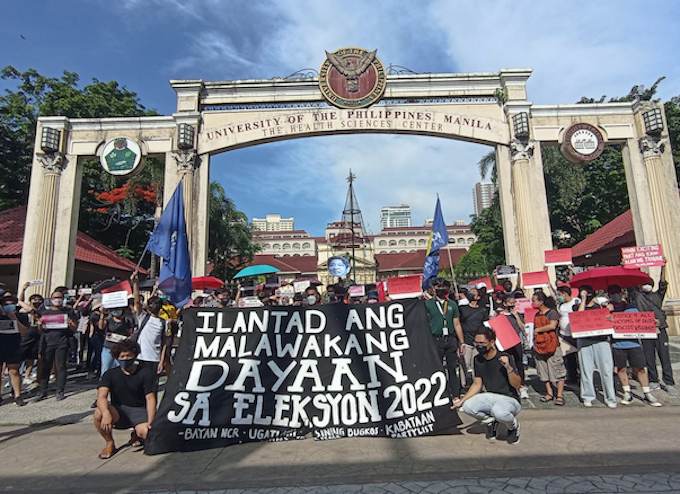
David Robie also blogs at Café Pacific
Sadly, the Philippines has sold its soul. Thirty six years ago a People Power revolution ousted the dictator Ferdinand Marcos after two decades of harsh authoritarian rule.
Yesterday, in spite of a rousing and inspiring Pink Power would-be revolution, the dictator’s only son and namesake “Bongbong” Marcos Jr seems headed to be elected 17th president of the Philippines.
And protests have broken out after the provisional tallies that give Marcos a “lead of millions” with more than 97 percent of the vote counted. Official results could still take some days.
- READ MORE: 36 years after ousting dictator Marcos, Filipinos elect son as president
- Other Philippine election reports
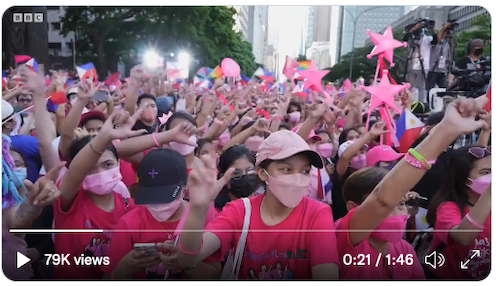
Along with Bongbong, his running mate Davao City Mayor Sara Duterte, daughter of strongman Rodrigo Duterte, president for the past six years and who has been accused of human rights violations over the killings of thousands of alleged suspects in a so-called “war on drugs”, is decisively in the lead as vice-president.
On the eve of the republic’s most “consequential election” in decades, Filipina journalism professor Sheila Coronel, director of practice at the Columbia University’s Toni Stabile School of Investigative Journalism in New York, said the choice was really simple.
“The election is a battle between remembering and forgetting, a choice between the future and the past.”
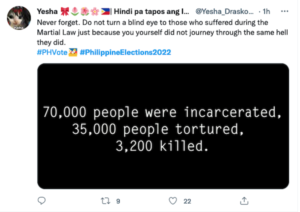
Significantly more than half of the 67.5 million voters have apparently chosen to forget – including a generation that never experienced the brutal crackdowns under martial law in 1972-1981, and doesn’t want to know about it. Yet 70,000 people were jailed, 35,000 were tortured, 4000 were killed and free speech was gagged.
Duterte’s erosion of democracy
After six years of steady erosion of democracy under Duterte, is the country now about to face a fatal blow to accountability and transparency with a kleptomaniac family at the helm?
Dictator Marcos is believed to have accumulated $10 billion while in power and while Philippine authorities have only been able to recover about a third of this though ongoing lawsuits, the family refuses to pay a tax bill totalling $3.9 billion, including penalties.
#PHVoteResults: Ferdinand Marcos Jr. already with 30,934,060 votes, Sara Duterte now at 31,367,252 in partial, unofficial results with 97.62% precincts reporting as of May 10, 2:11 pm.#PHVote #WeDecide https://t.co/Am3U4QDynn pic.twitter.com/oPqIXd2yDA
— Rappler (@rapplerdotcom) May 10, 2022
In many countries the tax violations would have disqualified Marcos Jr from even standing for the presidency.
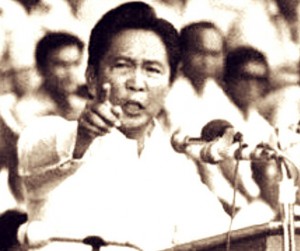
“A handful of other autocrats were also busy stealing from their people in that era – in Haiti, Nicaragua, Iran – but Marcos stole more and he stole better,” according to The Guardian’s Nick Davies.
“Ultimately, he emerges as a laboratory specimen from the early stages of a contemporary epidemic: the global contagion of corruption that has since spread through Africa and South America, the Middle East and parts of Asia. Marcos was a model of the politician as thief.”
Tensions were running high outside the main office of the Commission on Elections (Comelec) in Intramuros, Manila, today as protests erupted over the “unjust” election process and the expected return of the Marcoses to the Malacañang Palace.
The Comelec today affirmed its dismissal of two sets of cases – or a total four appeals – seeking to bar Marcos Jr. from the elections due to his tax conviction in the 1990s.
Ruling after the elections
The ruling was released a day after the elections, when the partial, unofficial tally showed that the former senator was on the brink of winning the presidency.
It wasn’t entirely surprising, as five of the seven-member Comelec bench had earlier voted in favour of the former senator in at least one of the four anti-Marcos petitions that had already been dismissed
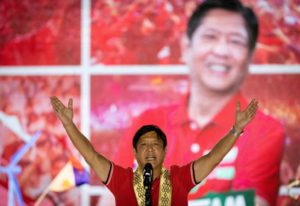
One further appeal can be made before the Supreme Court.
As mounting allegations of election fraud and cheating greeted the provisional ballot trends, groups began filing formal complaints.
One watchdog, Bakla Bantay Boto, said it had received “numerous reports of illegal campaigning, militarised polling precincts, and an absurd [number] of broken vote counting machines (VCMs)” throughout the Philippines.
STATEMENT ON THE MAY 9, 2022 PHILIPPINE ELECTIONS – Fraud, violence, electioneering, and unreliable voting machines have stained the 2022 Philippine national elections#BaklaBantayBoto2022 pic.twitter.com/vWqhmVgwii
— Bakla Bantay Boto (@baklabantayboto) May 9, 2022
“Intensified violence has also marked today’s election. Poll watchers have been tragically killed in Buluan, Maguindanao and Binidayan, Lanao del Sur, while an explosive was detonated in a voting centre in Kobacan, Cotabato.
“The violent red-tagging of several candidates and party lists [was] also in full force, with text blasts to constituents and posters posted within polling precincts, insinuating that they are linked to the CPP-NPA-NDFP [Communist Party of the Philippines and allies].”
Social media disinformation
Explaining the polling in the face of a massive social media disinformation campaign by Marcos supporters, Rappler’s livestream anchor Bea Cupin noted how the Duterte administration had denied a renewal of a franchise for ABS-CBN, the largest and most influential free-to-air television station two years ago.
This act denied millions of Filipinos access to accurate and unbiased news coverage. Rappler itself and its Nobel Peace laureate chief executive Maria Ressa, were also under constant legal attack and the target of social media trolls.
A BBC report interviewed a typical professional troll who managed hundreds of Facebook pages and fake profiles for his clients, saying his customers for fake stories “included governors, congressmen and mayors.”
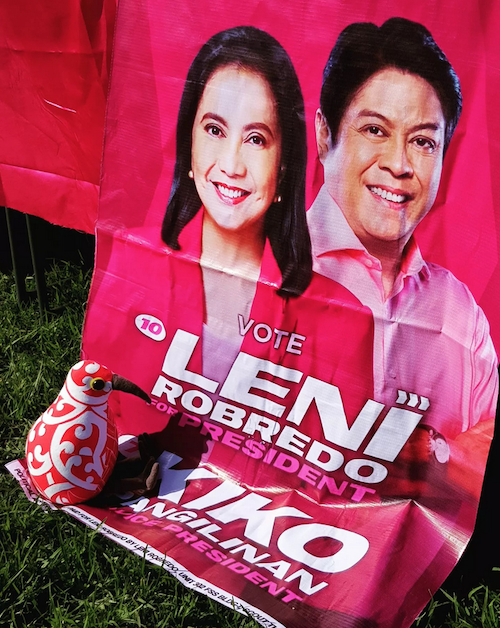
Meta — owners of Facebook — reported that its Philippines subsidiary had removed many networks that were attempting to manipulate people and media. They were believed to have included a cluster of more than 400 accounts, pages, and groups that were violated the platform’s codes of conduct.
Pink Power candidate human rights lawyer Leni Robredo, who defeated Marcos for the vice-presidency in the last election in 2016, and who was a target for many of the troll attacks, said: “Lies repeated again and again become the truth.”
Academics have warned the risks that the country is taking in not heeding warnings of the past about the Marcos family. An associate professor of the University of Philippines, Dr Aries Arugay, reflects: “We just don’t jail our politicians or make them accountable … we don’t punish them, unlike South Korean presidents.”
As Winston Churchill famously said in 1948: “Those that fail to learn from history are doomed to repeat it.”


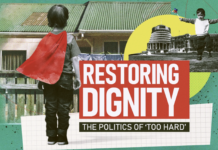
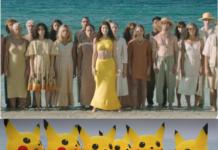

Long before Churchill, I think it was Hegel who wrote: “We learn from history that no-one learns from history.”
The few who understand the lessons watch aghast as others repeat the mistakes.
A simple man learns from his mistakes.
A smart man learns from the mistakes of others.
an even smarter man says “stay out of the comment section”
This election seems to be helpful for the USA Government, Marcos Jr is some what anti – China Government…
What could possibly go wrong?
Sad,bound to repeat the mistakes of the past,gotta get that hand in the till there’s a few more billions to pilfer & a few more pairs of shoes to get!
after duarte, attila the hun would be a step up
the thing with nostagia is it’s not an actual memory of the past but a projection of how you wish it had been.
The democrats didn’t deliver for them, see America, Russia. See us for that matter.
I think at the back of all this brouhaha today are some features that we need to bring to the fore and learn to do with graphic art or embroider, to put in a prominent place outside, in our homes, on our hearts; that we learn from a very young age before we can reason even before we can speak and understand words. That the Phillipinnes? would return to Marcos is a case of returning to a default position similar to that reached previously and influenced by cultural and economic hegemony. The period since the Marcos pair has probably not brought about enough change in living standards or thinking toencourage thought to a better way. It is certainly hard to change to a path significantly different and bringing improvement that is good for all to varying extents, as experienced here in NZ.
Passing understanding of the past to the children, how do we do that? From a young age parents or caregivers have to compete with television, peer pressure, fashion and general lack of understanding as to what is important to know on the part of society. Both parents and children turn to devices instead of talking, communicating with each other. Perhaps limit television to once a week? Discuss and research background on something that the children have heard about. That would be novel.